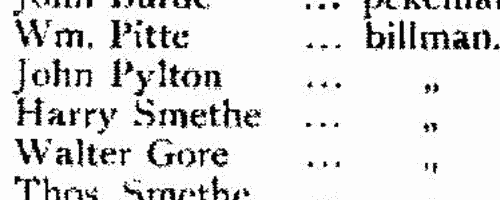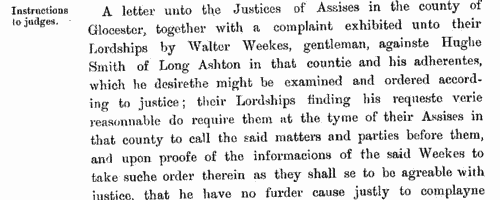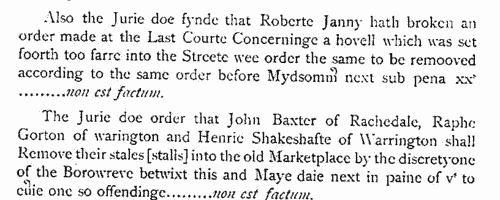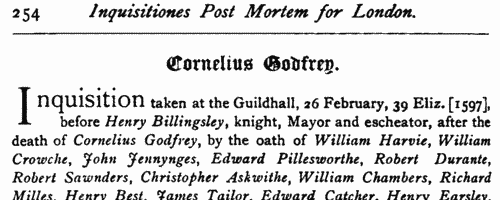Slade Surname Ancestry ResultsOur indexes 1000-1999 include entries for the spelling 'slade'. In the period you have requested, we have the following 1021 records (displaying 41 to 50): Single Surname Subscription | | | Buying all 1,021 results of this search individually would cost £5,948.00. But you can have free access to all 1,021 records for a year, to view, to save and print, for £100. Save £5,848.00. More... |
These sample scans are from the original record. You will get scans of the full pages or articles where the surname you searched for has been found. Your web browser may prevent the sample windows from opening; in this case please change your browser settings to allow pop-up windows from this site. Militia in Whitley hundred, Somerset
(1569)
A muster of the ablemen, gunners, light horsemen, pikemen, archers and billmen available from this hundred, compiled by sir Hugh Paulet, sir Maurice Barkeley, sir Ralph Hopton and John Horner in answer to a royal commission of the 11th year of queen Elizabeth. The returns are arranged by tithing. The hundred consisted of the parishes of Ashcott, Blackford, Butleigh, Compton Dundon, Cossington, Gre(i)nton, High Ham, Holford, Holton, Middlezoy, Moorlinch, Othery, Milton Podimore, Shapwick, Street, Walton, West Monkton, Weston Zoyland, Wheathill and Woolavington, northeast of Bridgwater. (The sample shown is from the return for the borough of Axbridge)SLADE. Cost: £6.00.  | Sample scan, click to enlarge

| Liegemen and Traitors, Pirates and Spies
(1571-1575)
The Privy Council of queen Elizabeth was responsible for internal security in England and Wales, and dealt with all manner of special and urgent matters
SLADE. Cost: £4.00.  | Sample scan, click to enlarge

| Liegemen and Traitors, Pirates and Spies
(1580-1581)
The Privy Council of queen Elizabeth was responsible for internal security in England and Wales, and dealt with all manner of special and urgent matters
SLADE. Cost: £4.00.  | Sample scan, click to enlarge

| Inhabitants of Manchester
(1590)
The Court Leet and View of Frankpledge of the manor of Manchester in Lancashire was held twice a year on the first Thursdays after Easter and Michaelmas. The record of each court starts with a list of the jurors, and then records the deaths of tenants and burgesses, with the names of their heirs, who were to do suit to the court; and transfers of burgages by sale, and homage of new burgesses. Then there are presentments of all manner of minor enroachments and misdemeanours, such as blocking of ditches, stopping of highways, noisome drains, &c. Finally there are new general ordinances, often with the appointment of officers to see that they are enforced. Every Michaelmas saw the swearing in of a long list of officers for the coming year, including the borough reeve, constables, market lookers, mise layers and gatherers, sealers of leather, officers for fruit and wholesome bread and (the prevention of) football, aletasters, bylawmen (burleymen), scavengers, (ap)praisers, catchpole, swineherd, and also the affeerers, who judged the fines to be levied by the court. The sample scan is taken from 1597. This index covers the court of 1 October 1590.SLADE. Cost: £6.00.  | Sample scan, click to enlarge

| Yorkshire Marriage Licences
(1595)
William Paver, a 19th-century Yorkshire genealogist, made brief abstracts of early marriage licences (now lost) in York RegistrySLADE. Cost: £4.00.  | Sample scan, click to enlarge

| Hastings family deeds
(1100-1600)
John Harley of the Historical Manuscripts Commission was invited by Reginald Rawdon Hastings to examine his family's extensive archives at the Manor House, Ashby de la Zouche, in Leicestershire. Harley produced a detailed calendar, of which is the first volume, published in 1928, Hastings himself having since died, and Harley having been killed at Gallipoli. This volume covers four categories of the records: the Ancient Deeds; Manorial and other Documents; Accounts and Inventories; and Miscellaneous Papers. Most, but not all, of the material is mediaeval. About half of the deeds relate to the family property in Leicestershire; then there are sections for Derbyshire, Nottinghamshire, Northamptonshire, Lincolnshire, Warwickshire, Staffordshire, Yorkshire, Northumberland, Norfolk, Cambridgeshire, Huntingdonshire, London, Wiltshire, Somersetshire, Devonshire, Buckinghamshire, Oxfordshire, &c. The manorial section includes a partitions of the estates of the Earls of Leicester and Wilton about 1204 and 1277; manor court rolls are mentioned, but not extracted. Choicer items from the family accounts and inventories are copied in extenso for 1596 and 1607, and thereafter summarised. Most of the later material is merely dipped into for curiosities.SLADE. Cost: £4.00.  | Sample scan, click to enlarge

| Essex Feet of Fines: Trinity 44 Elizabeth
(1602)
Abstracts of Essex pedes finium - law suits, or pretended suits, putting on record the ownership of land.SLADE. Cost: £4.00.  | Sample scan, click to enlarge

| Middlesex Sessions
(1549-1603)
This printed calendar collates a number of surviving records from Middlesex sessions for the period. Principally these are the Gaol Delivery Rolls (G. D. R.) and the General Sessions of the Peace Rolls (G. S. O. P. R.). Both series cover general criminal indictments (bills) together with the recognizances of the witnesses to attend; but the Gaol Delivery Rolls, by their very nature, tend to deal with the more serious cases - felonies where the accused could not be released on bail. The General Sessions rolls also include the sheriff's lists of bailiffs, sub-bailiffs, high and petty constables in the shire; writs of venire facias for production of jurors, writs of capias, lists of jurors, jury-panels &c. The Gaol Delivery Rolls also include coroners' inquests, writs of supersedeas, and memoranda of proclamations. Special inquiries are recorded in separate Sessions of Oyer and Terminer (S. O. T.) rolls and Inquest or Inquisition rolls (I. R.) Although coverage is good, none of the sequences of rolls for this period is complete. A peculiarity of this calendar is that in the case of actual incidents, the date given at the start of each entry is the date that the incident was alleged to have taken place (for instance, 1 June 11 Elizabeth (1569) in the sample scan) rather than the date of the court proceedings. SLADE. Cost: £4.00.  | Sample scan, click to enlarge

| London Inquisitions Post Mortem
(1577-1603)
Full and complete abstracts of inquisitions post mortem for the City of London in this period. These are inquiries as to the real estate and heir of each person holding in capite or in chief, i. e. directly, from the Crown. The precise date of death of the deceased and the age and relationship of the heir are usually recorded. This index covers all names mentioned, including jurors, tenants, &c. This abstract also includes a handful of earlier items omitted from previous volumes.SLADE. Cost: £4.00.  | Sample scan, click to enlarge

| London Marriage Allegations
(1521-1610)
London, Essex and part of Hertfordshire lay within the diocese of London. In the later 17th century the individual archdeaconry courts issued marriage licences, but for this period the only surviving material is from the overarching London Consistory court. The main series of marriage allegations from the consistory court starts 7 December 1597, and these were extracted by Colonel Joseph Lemuel Chester; Colonel Chester then discovered earlier material, back to 5 January 1521, in Vicar-General's Books of the Principal Probate Registry. The notices in these books were much briefer, but as well as extending back so much earlier, they included additional material for 1597 onwards. All this he collated with the consistory court extracts, and the text was edited by George J. Armytage and published by the Harleian Society in 1887. A typical later entry will give date; name, address and occupation of groom; name, address and condition of his intended bride, and/or, where she is a spinster, her father's name, address and occupation. Lastly we have the name of the church where the wedding was going to take place; or the words Gen. Lic. signifying a general or open licence.SLADE. Cost: £4.00.  | Sample scan, click to enlarge

|
Research your ancestry, family history, genealogy and one-name study by direct access to original records and archives indexed by surname.
|












